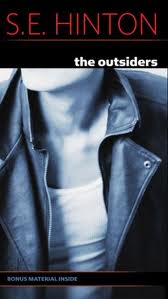The Outsiders by S.E. Hinton
Reviewed by Ellen

An ALA Best Young Adult Books
Ratings Explanation
Language: A few instances of “hell” and “damnit”; though some of the boys swear a lot, the words are never spelled out and are frequently written as “—–” or “he cussed” or “he said words that made my ears turn red”.
Violence: Ponyboy is jumped when walking home from the movies by himself. A knife is held to his throat. His best friend Johnny is severely beaten by the Socs. Darry hits Ponyboy across the face. Johnny stabs and kills a Soc in self-defense. A church catches fire and Ponyboy and Johnny rush inside to rescue trapped children; Johnny is critically injured from the fire with a broken back and third degree burns. Johnny later dies. Dally robs a grocery store at gunpoint and the police fire at him multiple times, killing him. A big rumble between the Greasers and the Socs leaves everyone fairly beaten up. Many other references to gangfights, street fighting, and rumbles.
Sexual Content: Dally talks dirty to two Soc girls at the drive-in movie (but what he says is only implied, not detailed). It is alluded to that Soda’s girlfriend has gotten pregnant, but by someone else, not Soda.
Adult Themes: The Greasers live a hard-scrabble life of shoplifting, fighting, and frequently getting arrested. Ponyboy and Johnny have never been arrested, but their friends have. Everyone smokes (cigarettes are called “weeds”); a few get drunk. References to getting “stoned” or “smashed”. Ponyboy, Soda, and Darry are three brothers who live together after their parents were killed in a car accident. They worry that social services may come and split them up. Darry, the oldest, is harsh and yells a lot; he struggles with the responsibility of raising his brothers. Johnny’s parents are cruel and abusive, both emotionally and physically. Many of their friends come from broken homes or have abusive fathers who kick them out on the streets. After Johnny kills a Soc, he and Ponyboy run away with a gun. They disguise themselves to avoid being recognized.
Synopsis
It is 1960s Oklahoma, and in the town where Ponyboy Curtis lives, there are two kinds of kids: the “Socs” (or SOSH-es, short for “socials”), rich kids from the West side who drive Mustangs, wear Madras, have Beatles haircuts and big egos, and pretty much get away with anything. Then there are the “Greasers”, the group to which Ponyboy belongs, the proud East-side rebels who live on the wrong side of the tracks and have never had anything easy. With switchblades in their pockets and their long, greased-up hair, they always have to watch their backs, since the Socs bring trouble with them whenever they cruise into Greaser territory. Ponyboy’s friends are true to each other, even if they aren’t always law-abiding, and Ponyboy mostly tries to get good grades and stay out of trouble. But one day, when he and Johnny make friends with Socs Cherry and Marcia, it sets in motion a violent chain of events that will turn his world upside down.
I first picked this book up when I was about fourteen and remember my feelings at the time: how dark and different the world of Ponyboy the Greaser was from my relatively unadulterated, happy family life. Ponyboy’s world is violent and tragic and life is unfair for him, but written from his perspective, the commentary on social stigmas feels honest and real. “I could picture boys living on the wrong sides of cities, boys with black eyes who jumped at their own shadows…boys who maybe watched sunsets and looked at stars and ached for something better…boys going down under street lights because they were mean and tough and hated the world, and it was too late to tell them that there was still good in it, and they wouldn’t believe you if you did. Someone should tell their side of the story, and maybe people would understand then and wouldn’t be so quick to judge a boy by the amount of hair oil he wore.” It’s hard to believe the author was a 16-year-old girl at the time. An excellent book and recommended, however, due to its gritty content, the drugs and violence, I would suggest a minimum reading age of 14.









